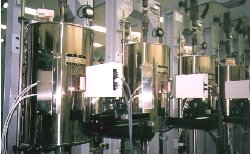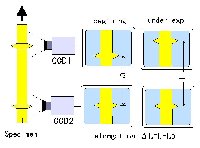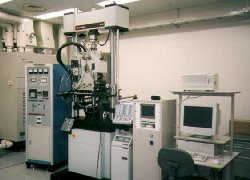Mechanical properties
After we design alloys, we test their mechanical properties such as tensile and compression strengths between room temperature and 1800oC, and also creep tests to find out if our alloys have sufficient mechanical properties to be used as high temperature materials. We have 30 creep tewsting machines of which 26 are capable of carring out creep rupture tests up to 1150oC, and creep tests upto 1000oC and strain can be detected by conventional strain gage. Other 4 machines have quite a new measurement method of strain using CCD camera; thus we can do creep tests up to 1150oC (details is as follows). We also investigate new generation high temperature materials. We test tensile and compression strengths and creep behaviour between 1200 and 1800oC (details as follows). For tensile and compression tests up to 1200oC, we use TENSILON/UTM-1-50000CW.
Mechanical Property Testing Methods
- Our equipment for mechanical properties


A new system wes developed under collaboration work with Toshin Kogyo and our research group. The CCD camera is put outside of the furnance with a small window, so that the sample can be observed through the window. We need a sample with two projections as shown in fig to detect the strain. The CCD camera memorizes the projections shape and position first. During creep test, position of the projections changes. The CCD camera records the changes of the projection position. This corresponds to the elongation of samples. We can not carry out creep tests above 1000oC because we can not use strain gage above 1000oC. If we use a CCD camera, the testing temperature limitation depends on the furnance itself.
- Ultra-high temperature testing machines (above 1200oC)

Spec:
- Max temerature: 2200oC
- Max load: 5000kgf
This machine is based on INSTRON 3560 and modified for tensile and compression tests and creep test. This furnance can reach up to 2000oC by W mesh heater. We use W sample holder. C plate is also used for compression tests. The CCD camera system is also used for this systems to detect strains.